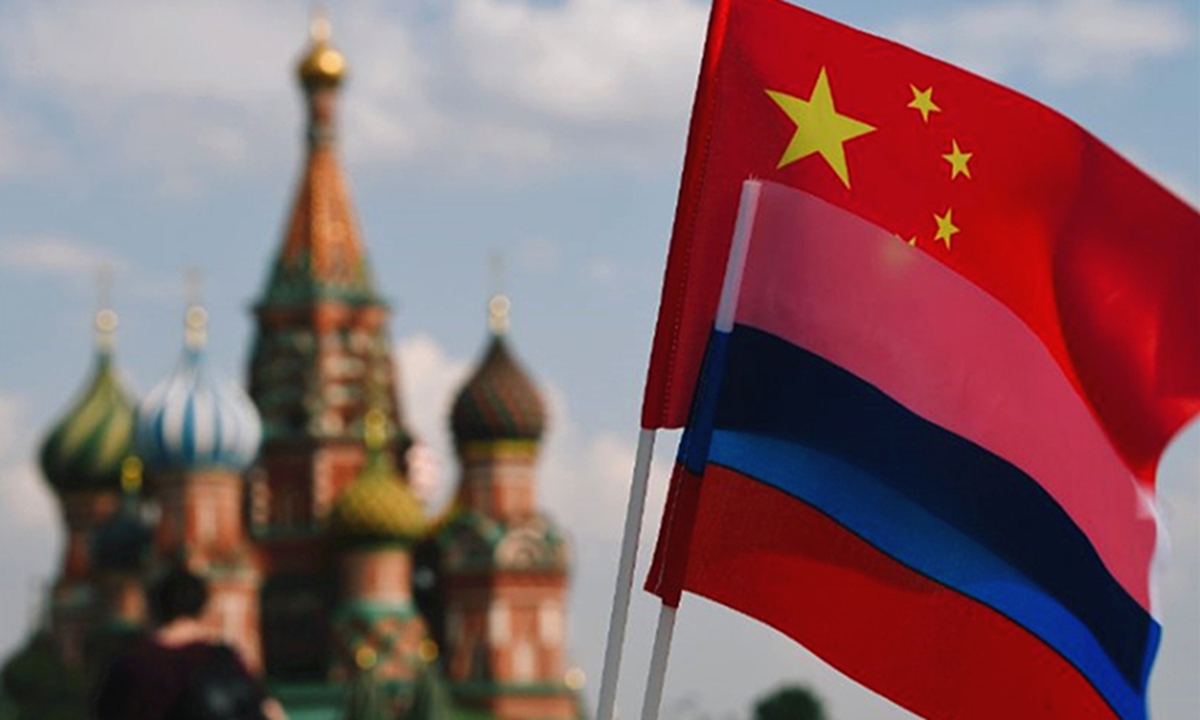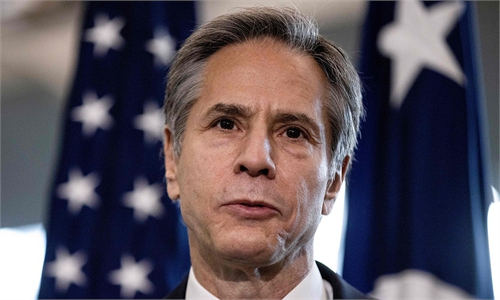
The national flags of China and Russia are seen on Red Square, Moscow. Photo: Xinhua
Fifty years ago, the lawful rights of the People's Republic of China (PRC) were restored in the United Nations, paving the way for the PRC to promote multilateralism and cooperation with other countries, among which close interactions between Beijing and Moscow are particularly prominent.
In recent years, both countries coordinated within the UN framework by presenting shared position regarding most important issues of international concern - be it Syria-related agenda of blocking sanctions on the Syrian government earlier in 2017 or the international spat over humanitarian cross-border aid corridors there. On the Afghanistan issue, Moscow and Beijing similarly advocated to lift economic sanctions from Afghanistan and unfreeze country's assets with earlier common abstentions from US-drafted UN Security Council resolution seeking to hold the Taliban accountable. The two are also seeking sanctions relief for North Korea, have buttressed Iran within the UNSC, and vowed to jointly defend victorious outcomes of World War II.
Recently, Russia and China have experienced a substantial uplift in their already burgeoning bilateral relationship. The two celebrated the 20th anniversary of the signing of Russia-China Treaty on Good-Neighborliness and Friendly Cooperation. That is one of the most pressing issues lately for Moscow and Beijing against the evolving backdrop of US-led acrimonious front aimed to contain both states. It is evident from US official labels of them as major national security threats.
The US-inspired AUKUS alliance and reinforced Quad security group aimed at curbing Beijing is another case. This inevitably encourages China to conduct closer cooperation with Russia to seek reciprocal responses to hostile acts. Putting NATO and the US aside, the EU has also been tapping on its anti-Russia/China potential wringing them both with multitude human rights-related sanctions. EU pursuit of a more galvanized engagement in Indo-Pacific affairs as identified by its Indo-Pacific strategy is also likely to see more coordinated opposing from Russia and China.
This is best exemplified by the mid-October joint navy drills in the Sea of Japan. In a clear blow to Washington, for the first time the maneuvers featured both states' joint traverse via the Tsugaru Strait. This is designated as an international waterway and has been routinely used by US ships. Amid the intensified rivalry with the US, Russia and China is expected to integrate Beijing and Moscow military-to-military exchanges deeper. This will witness the two comrades conducting joint air and sea patrols at one time - a practice that has not been done yet.
Earlier in August, Moscow and Beijing conducted their first joint military drills held on the Chinese soil with more intense penetration of bilateral usage of each other's weaponry. This was demonstrated by the fact that servicemen from both sides were granted permission to try and test each other's military vehicles and equipment in order to increase liaison and benefit bilateral trust-building.
Meanwhile, Moscow and Beijing have been showcasing their political "bromance." Against the heightening rhetoric around the island of Taiwan by the US in recent time, Moscow has reinforced its unambiguous position on the island as part of China and as the country's Foreign Minister Sergey Lavrov stated, "We have proceeded and will proceed from this premise in our foreign policy." President Vladimir Putin also fended off any speculations about military-scenario for the reunification of China by claiming in interview with CNBC that "I think China does not need to use force. China is a huge powerful economy… [that] is capable of implementing its national objectives."
Moscow also reassured critics of its non-interference position with regard to the South China Sea issues, giving China and all claimants an opportunity to tackle the issues on their own. Furthermore, Russia has identified no threats over reports of China's so-called hypersonic weapon tests and highlighted that Beijing does not go beyond the scope of any international commitments.
Moscow and Beijing see a huge potential in closer coordination on multilateral front. They have been facilitating greater international profiles at the Shanghai Cooperation Organization (SCO) with the latest move to commence the Iran admission process. The SCO has also been promoted as a venue for closer cooperation of all member states on the Afghanistan issue, especially in its security domain via regular SCO flagship military drills known as "Peace Mission."
With no signs of global tensions abating, Moscow and Beijing are most likely to continue these dynamics of close multilateral interaction, especially amid heightened political turbulence and destructive behavior of the US.
The author is an expert at the Russian International Affairs Council. opinion@globaltimes.com.cn

